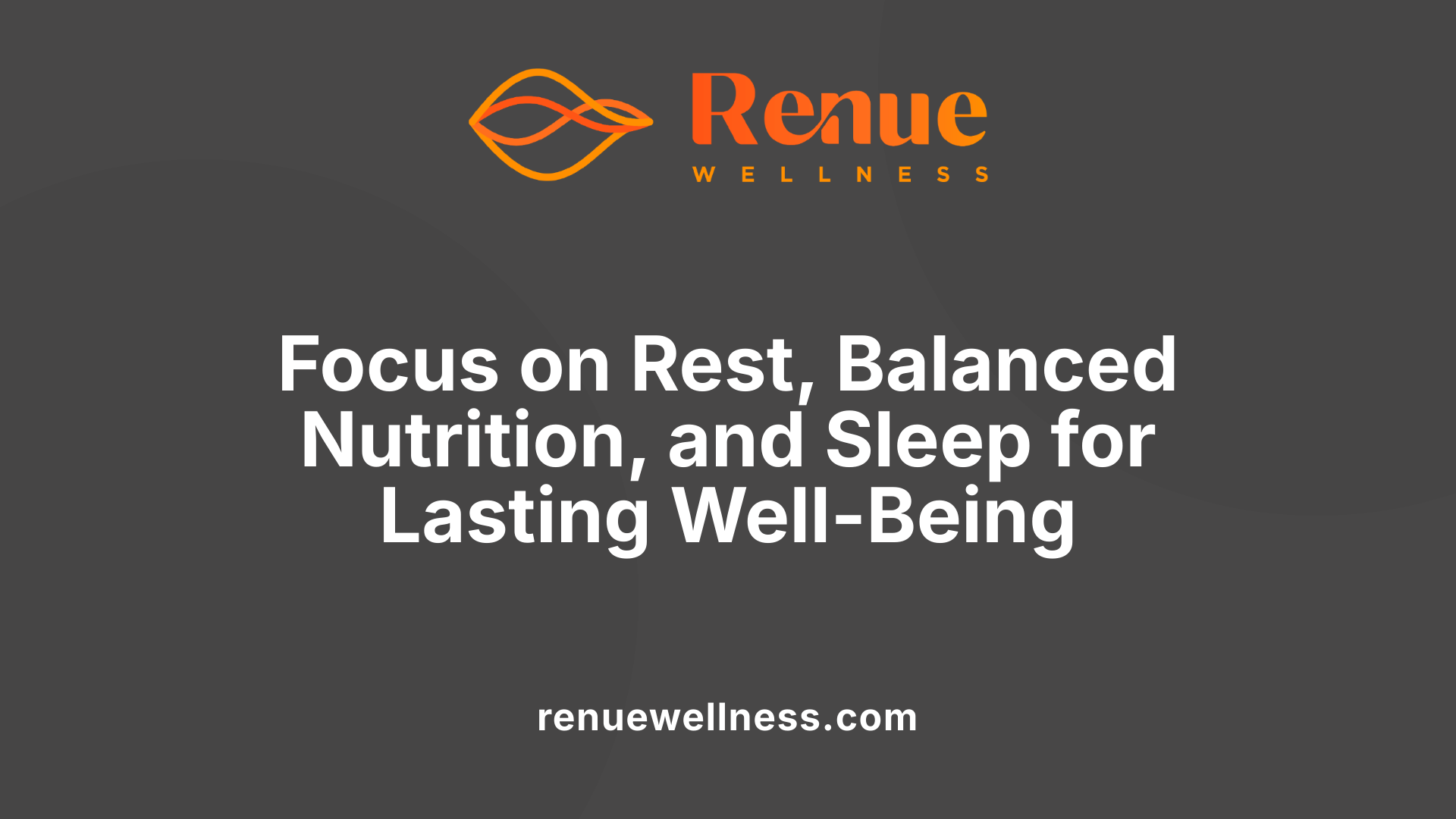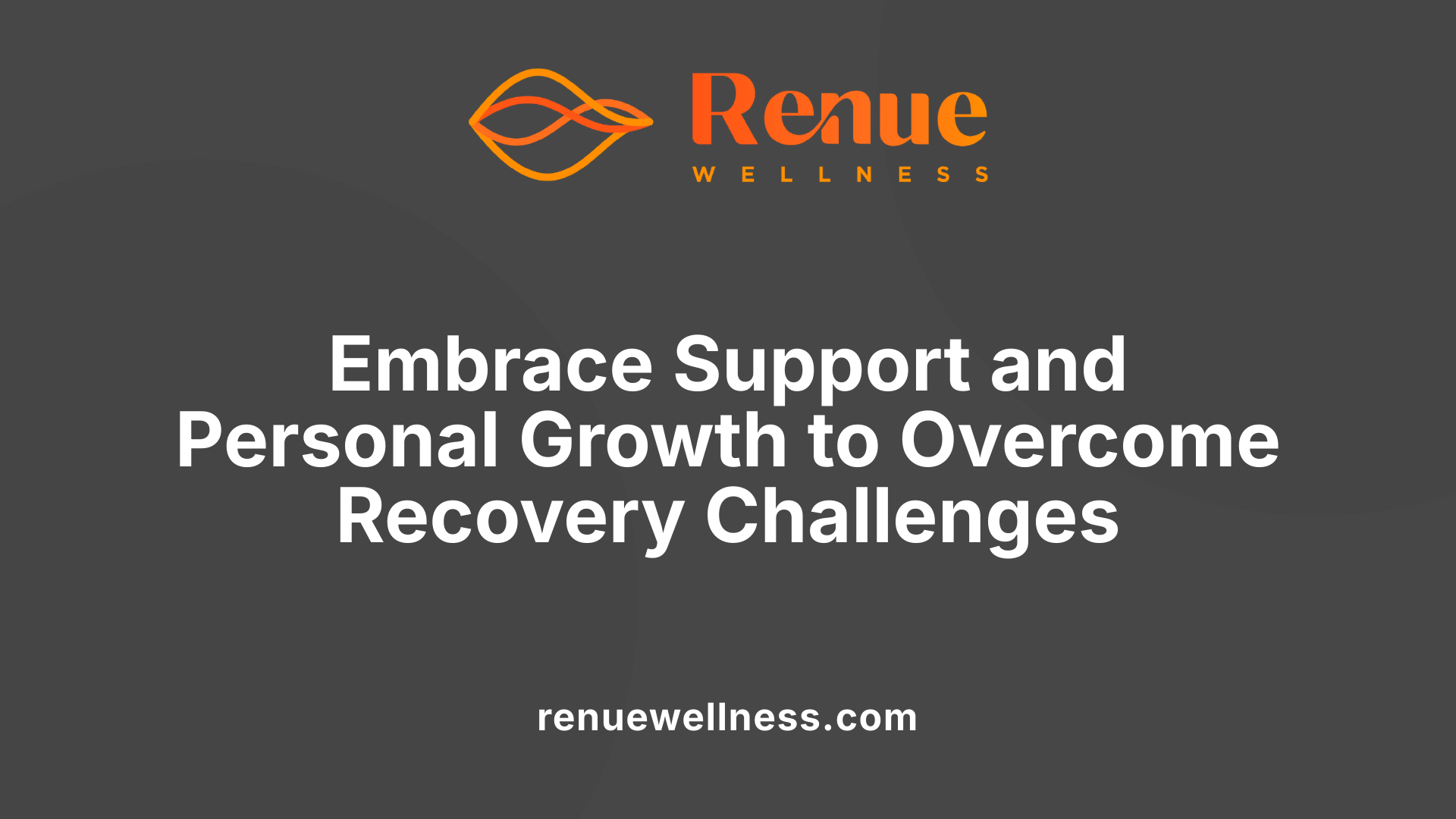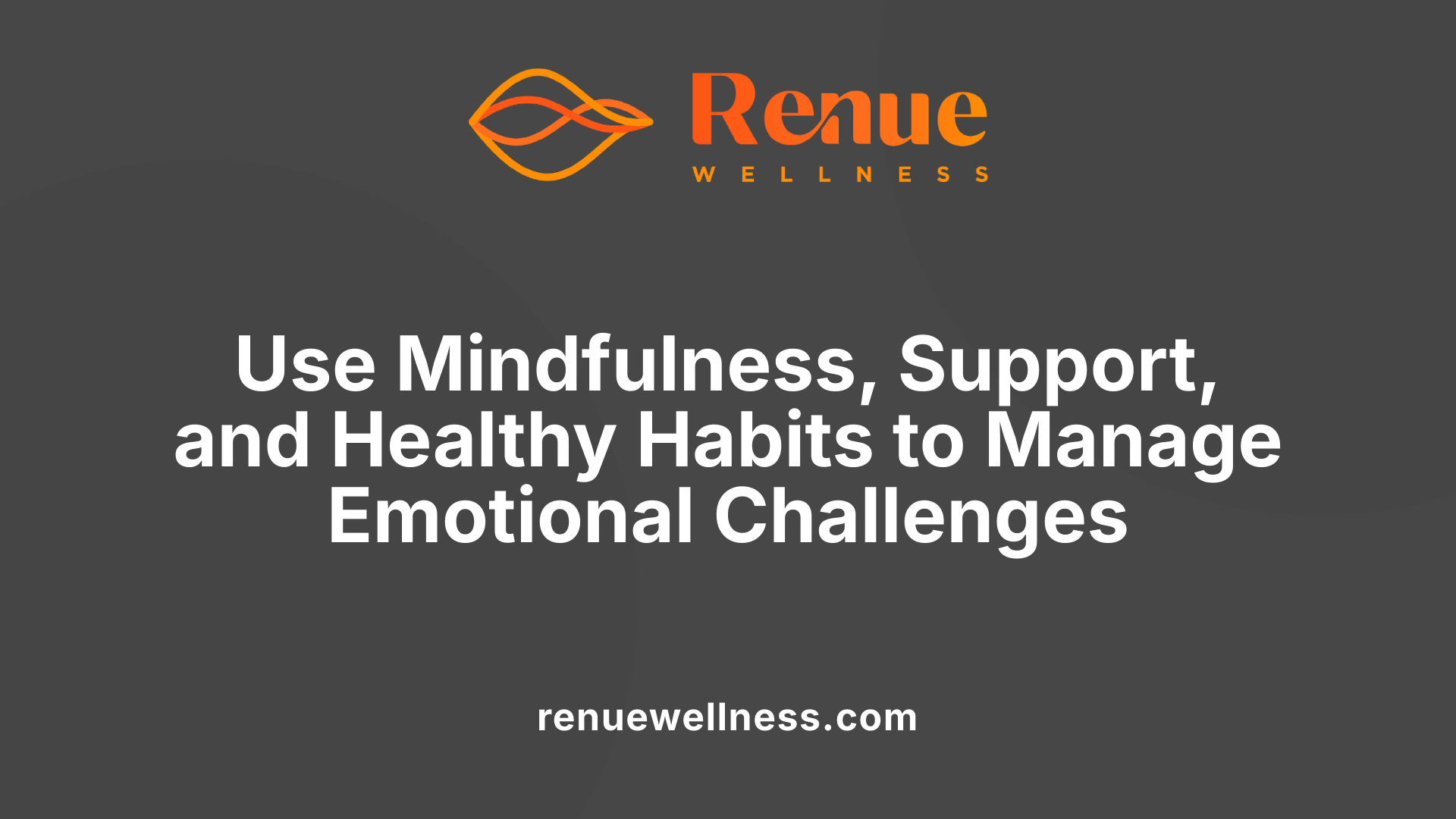How to Maintain Mental Wellness After Treatment Ends


August 13, 2025
Understanding the Journey Beyond Treatment
Completing treatment for serious illness or addiction marks a significant milestone, but the path to full recovery continues into a new phase characterized by emotional and physical adjustments. Maintaining mental wellness during this period is vital for a holistic recovery, involving proactive measures, support systems, and lifestyle practices that foster resilience and well-being. This article explores comprehensive strategies backed by credible sources to help survivors and recovering individuals sustain mental health and navigate the complexities of life after treatment.
Building a Foundation: Follow Healthcare and Self-Care Recommendations

What strategies and practices can help maintain mental wellness after completing treatment?
Maintaining mental wellness after finishing cancer treatment is a vital part of ongoing recovery. It involves establishing consistent self-care routines that strengthen emotional resilience and emotional health.
One of the most important practices is adhering closely to medical advice and prescribed therapies. Attending all follow-up appointments and screenings can detect any early signs of recurrence or physical issues, providing reassurance and early intervention if necessary.
In addition, engaging in regular self-care activities such as exercising, eating a balanced diet, and ensuring adequate sleep significantly boosts mental health. Exercise, especially aerobic activities and muscle-strengthening exercises, releases endorphins that naturally improve mood and reduce stress.
Creating a supportive environment is equally essential. Building a network of family, friends, healthcare providers, and support groups offers emotional backing and practical assistance. This support system helps survivors express feelings, share experiences, and gain motivation to stay committed to their health journey.
Furthermore, pursuing purposeful activities like hobbies, volunteering, or learning new skills can provide a sense of accomplishment and joy. These activities help rebuild a positive self-image and renew motivation.
Self-monitoring is also crucial—regularly checking in with oneself about mood, sleep quality, anxiety levels, and physical symptoms can catch early signs of emotional distress. Seeking professional help when needed ensures timely intervention and continuous mental health support.
Overall, combining these strategies fosters a balanced approach to post-treatment life. It helps survivors move forward with confidence, resilience, and a sense of regained control over their health and well-being.
Prioritizing Rest and Nutrition for Emotional Stability

What strategies and practices can help maintain mental wellness after completing treatment?
Maintaining mental wellness after finishing cancer treatment involves several important self-care practices. Regular exercise, coupled with a balanced diet and sufficient sleep, is crucial for supporting emotional resilience. Exercise, especially aerobic activities and muscle-strengthening routines, helps regulate body weight and improve mood, reducing feelings of depression.
Eating nutritious foods, such as those in the Mediterranean diet, which emphasizes fruits, vegetables, whole grains, nuts, and healthy fats, can positively influence mood and cognitive function. Proper nutrition provides essential nutrients that repair the body and the brain, fostering better mental health.
Getting enough sleep is equally vital. For teens and adults, aim for 8-10 hours of quality sleep each night to allow the body and brain to repair, recharge, and stabilize emotional health. Establishing a calming bedtime routine and avoiding screens before sleep can improve sleep quality.
Incorporating these habits consistently, along with following professional recommendations and attending regular follow-up appointments, helps prevent setbacks. Building a strong support network of loved ones and healthcare providers offers emotional and practical assistance during recovery. Engaging in hobbies, volunteering, and focusing on personal growth can add purpose, fostering a positive outlook. Lastly, self-checks—asking about sleep, mood, and stress—enable timely responses to emotional or physical concerns.
By combining these practices, survivors can develop a sustainable routine that promotes mental health, resilience, and overall well-being after treatment.
Physical Activity and Creative Outlets as Therapeutic Tools
How can individuals manage emotional health, fears, and stress during recovery?
Managing emotional health during recovery from serious health challenges such as cancer involves incorporating various self-care activities that nurture the mind and body. Regular exercise stands out as a vital component. Engaging in aerobic activities like walking, swimming, or cycling for at least one hour a week helps boost mood by releasing endorphins, which are natural mood lifters.
In addition to aerobic exercise, including muscle-strengthening activities a few times a week can improve physical confidence and provide a sense of accomplishment. These physical routines not only help maintain body strength but also foster discipline and normalcy, which are crucial in the post-treatment phase.
Practicing relaxation techniques such as meditation, deep breathing exercises, and journaling can significantly lessen feelings of anxiety and fear. Journaling allows individuals to process emotions, track progress, and set intentions. Coupled with gratitude exercises, these mindfulness-based practices support mental resilience, helping individuals focus on positive aspects of their recovery.
Building a support network is equally important. Sharing feelings with friends, family, or support groups creates a sense of community and reduces loneliness. Education about managing fears, such as understanding the importance of follow-up care and knowing what signs to watch for, can decrease feelings of helplessness.
Incorporating these activities—exercise routines, mindfulness practices, and social support—facilitates a holistic approach to emotional stability. They help individuals transition from merely surviving to proactively thriving and finding joy in everyday life.
More Information Search Query
For more insights, search for "exercise and relaxation for emotional health post-treatment" to explore various strategies and expert recommendations tailored to supporting mental wellness after health challenges.
Navigating Emotional Challenges: Fear of Recurrence and Physical Changes

Why is recovery after treatment often challenging, and how can one navigate this period?
Recovery after cancer treatment can be a difficult journey due to the physical, emotional, and psychological adjustments involved. Many survivors face feelings of uncertainty alongside physical side effects like fatigue and changes in appearance. Emotions such as fear, sadness, and anger are common, and adapting to a 'new normal' takes time.
One of the biggest challenges is managing the persistent fear of cancer recurrence. This worry can evoke anxiety, disrupt daily life, and impact mental health. However, there are practical ways to navigate this period.
First, maintaining a routine of regular follow-up appointments and tests provides reassurance and early detection of any signs of recurrence. Open communication with healthcare providers about concerns or symptoms is essential.
Second, building a strong support network—including family, friends, support groups, or mental health professionals—can provide comfort, share experiences, and reduce feelings of loneliness.
Third, engaging in self-care activities like meditation, journaling, and setting personal goals strengthens resilience. Physical activity, a balanced diet, and proper sleep are crucial for physical recovery and mental well-being.
Developing new interests and focusing on personal growth helps in finding purpose and joy beyond treatment. Techniques like mindfulness and gratitude exercises can reduce stress and foster emotional healing.
Ultimately, navigating the after-treatment phase involves patience, self-compassion, and acceptance. Accepting that recovery is a gradual process allows survivors to embrace the changes and look forward to new opportunities.
This approach—combining medical vigilance, emotional support, and self-care—supports a smoother transition into life after cancer, helping survivors rebuild confidence and hope.
How to manage body image concerns and physical changes
Post-treatment physical changes, such as scars, hair loss, or control of bodily functions, can impact self-esteem and body image. Feeling comfortable and confident requires a combination of practical and emotional strategies.
Caring for your skin, dressing in ways that make you feel good, and focusing on your strengths can boost self-worth. Affirming your self-value beyond appearance is critical.
Sharing your feelings with trusted loved ones or support groups can lessen shame or embarrassment. Engaging in activities that promote a positive self-image, like hobbies or gentle exercises, helps regain confidence.
Adjusting routines and seeking aesthetic solutions—such as skincare or styling—can also contribute to feeling better about physical appearance. Remember, many survivors find that focusing on inner qualities and resilience enriches their sense of identity.
Overall, coping with physical changes involves patience and kindness to oneself, recognizing that these adjustments are part of the healing journey. Support from healthcare professionals, counselors, and peer groups makes this transition more manageable.
By integrating these strategies, survivors can foster a positive outlook and embrace their new self with strength and kindness.
Managing Anxiety and Depression: Practical Coping Strategies

Recognizing symptoms of anxiety and depression
Understanding the signs of anxiety and depression is vital for early intervention. Common symptoms include persistent feelings of sadness, hopelessness, or emptiness, alongside physical signs like fatigue, sleep disturbances, and changes in appetite. Anxiety may present as excessive worry, restlessness, muscle tension, and irritability. Recognizing these symptoms allows individuals to seek timely help and develop coping tactics to manage their mental health effectively.
Self-screening and seeking professional help
Self-screening tools are available for individuals to monitor their mental well-being, and consulting healthcare professionals is essential if symptoms persist. Speaking openly with therapists, doctors, or counselors enables personalized support and treatment plans. Regular mental health check-ups, especially after significant life changes like cancer treatment, help maintain emotional stability and prevent escalation of distress.
What are some effective coping strategies for dealing with feelings of loneliness, anxiety, or depression post-treatment?
Effective strategies include maintaining a strong support network of family, friends, support groups, and mental health professionals, which provides ongoing emotional backing. Engaging in regular physical activity, such as walking, yoga, or outdoor hobbies, can significantly improve mood and reduce symptoms of depression and anxiety.
Practicing mindfulness techniques like meditation, deep breathing exercises, and journaling helps foster resilience and self-awareness, aiding emotional regulation. Cultivating gratitude through daily reflection can shift focus to positive aspects of life, building mental strength.
Prioritizing healthy habits like adequate sleep, balanced nutrition—particularly diets rich in omega-3s and antioxidants—and establishing consistent routines support emotional well-being and recovery. Regularly checking in with oneself about mood, habits, and symptoms helps catch early signs of distress.
Seeking professional support when necessary—through therapy, counseling, or support groups—is crucial. This ongoing vigilance and proactive approach help in sustaining mental health and navigating the journey of post-treatment adjustment.
More information
For further guidance, search using the phrase "coping with loneliness and anxiety post-treatment" to find supportive resources, community programs, and expert advice tailored to survivors' needs.
The Role of Support Systems and Community Resources
Building a supportive network of family, friends, and professionals
Creating a strong support system is vital for emotional recovery after cancer treatment. Family members, friends, healthcare providers, therapists, and spiritual leaders all play a role in offering encouragement, understanding, and practical assistance. Maintaining open communication and expressing feelings honestly can strengthen these relationships, making it easier to navigate the emotional ups and downs of life post-treatment.
Support networks help individuals feel less isolated and more connected. They provide emotional reassurance during difficult times and can motivate ongoing self-care and adherence to healthcare plans. Regular check-ins and participation in support groups help maintain a sense of community and shared experience.
Utilizing community and online support groups
Community-based and online support groups are valuable resources for survivors seeking connection and understanding. These groups offer peer support, practical advice, and a sense of belonging, which is especially important when physical support networks may be limited.
Joining in-person or virtual groups focused on cancer survivorship allows individuals to share experiences, discuss challenges like fear of recurrence, body image issues, or emotional struggles, and exchange coping strategies. Many organizations provide resources, counseling, and educational sessions that promote long-term well-being. Engaging with these communities can reinforce resilience, provide motivation, and foster hope.
| Support Resource Type | Benefits | Examples |
|---|---|---|
| Family & Friends | Emotional support, daily assistance | Spouses, children, close friends |
| Healthcare Providers | Medical guidance, mental health support | Therapists, oncologists, nurses |
| Support Groups | Peer understanding, shared experience | Local or online cancer survivorship groups |
| Community Programs | Educational resources, social activities | Local wellness centers, faith-based groups |
| Online Forums & Social Media | Anonymity, accessible support | Facebook groups, cancer forums |
How to adapt to a 'new normal' after treatment completion
Adapting to a 'new normal' involves setting realistic expectations and establishing habits that promote both physical and mental health. Regular routines like getting enough sleep—about 8-10 hours for teens—eating a nutritious Mediterranean diet, and engaging in at least an hour of physical activity help rebuild strength and confidence.
Continuing learned self-care practices such as journaling, mindfulness, and hobbies contributes to emotional resilience. Maintaining medical follow-ups ensures early detection of any recurrence and provides peace of mind. Building a support network for ongoing encouragement and accountability helps to manage setbacks.
Incorporating these strategies fosters a sense of stability and purpose, empowering survivors to face new challenges with confidence and hope. Remember, recovery is a gradual process, and patience with oneself is essential.
Long-Term Strategies for Mental Wellness and Emotional Resilience
Why is recovery after treatment often challenging, and how can one navigate this period?
Recovery after treatment is often a complex process that extends beyond the physical elimination of disease. Many individuals face emotional, mental, and psychological shifts that require ongoing effort and resilience. Physical side effects, changes in self-image, and fears of recurrence can contribute to feelings of uncertainty and distress.
To navigate this challenging phase, it is vital to prioritize practices that support mental health. Attending regular therapy or counseling sessions provides a safe space to process emotions, develop coping skills, and address ongoing concerns. Maintaining a healthy lifestyle—incorporating regular exercise, balanced nutrition, and sufficient sleep—helps repair both body and mind.
Building a supportive network is also essential. Support groups, friends, family, and healthcare providers can offer encouragement and reassurance. Engaging in personal growth activities, such as pursuing hobbies, setting new goals, or finding a sense of purpose, helps individuals transition from simply surviving to thriving.
Patience and self-compassion are key during this time. Celebrating small milestones along the way reinforces motivation and resilience. Recognizing progress, practicing kindness towards oneself, and seeking help when needed all contribute to long-term emotional stability. By embracing these strategies, survivors can foster ongoing mental wellness and build a fulfilling, resilient life post-treatment.
Embracing the Journey Toward Emotional Wellness
Sustaining mental wellness after treatment ends is a dynamic and ongoing process that demands self-awareness, proactive care, and community support. By integrating healthy lifestyle habits, practicing mindfulness, maintaining open communication with healthcare professionals, and cultivating a supportive network, individuals can navigate the post-treatment phase with hope and resilience. Taking consistent steps towards self-care and personal growth not only helps manage fears and emotional challenges but also fosters a renewed sense of purpose. Remember, recovery is a lifelong journey—each small effort counts toward building a fulfilling, balanced life beyond treatment.
References
- Stay Strong: 7 Ways To Maintain Mental Strength After Treatment
- Coping – Life After Cancer Treatment - NCI
- Your Emotions After Treatment | Dana-Farber Cancer Institute
- Mental Health Maintenance After Treatment: Tips for Staying on Track
- Cancer survivors: Managing your emotions after cancer treatment
- Life After Rehab: Maintaining Mental Health and Sobriety
- Managing Mental Health After a Cancer Diagnosis
- 7 ways to care for yourself after cancer treatment
- How to Deal With Anxiety After Cancer Treatment
- Emotional recovery after cancer treatment - Mayo Clinic Health System
Recent Posts
Conditions Treated
AnxietyDepressionOCDPTSDPostpartum DepressionPain ManagementSubstance AbuseSuicidal IdeationOur Location


